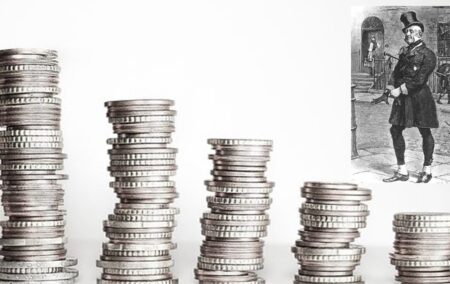But the option that is open to the government is to use other people’s money to fund its mounting shortfall.
Much everyday wisdom can be found in classic novels. In the great 19th century writer Charles Dickens’s David Copperfield, the incorrigibly hopeful Mr Micawber – who nevertheless winds up in a debtors’ prison – has some advice on minding money which remains eternally valid.
The wisdom he imparts to the titular character, Copperfield, is simple enough.
‘Annual income twenty pounds, annual expenditure nineteen six, result happiness,’ Micawber tells him. ‘Annual income twenty pounds, annual expenditure twenty pounds ought and six, result misery.’
In other words, don’t spend more than you earn. This is advice many South Africans would do well to take.
It applies in particular to an institution the decisions and actions of which affect the life of every South African, and which has not taken this advice but, indeed, done the opposite.
That institution is the South African government.
Today the government spends far more than it earns, which, as Mr Micawber can attest, seldom ends well.
But this was not always the case. When the African National Congress (ANC) came to power in 1994, it inherited a government which was effectively bankrupt. But the ANC confounded the expectations of many and, under both Presidents Mandela and Mbeki, kept spending under control. This hard work led to South Africa’s recording two consecutive budget surpluses in the mid-2000s – a remarkable achievement for an emerging market like South Africa and a country facing considerable challenges and political pressures. Over the same period, total government debt – as a proportion of gross domestic product (GDP) – declined to a record low of 26% in 2008/09.
Today, however, South Africa faces debt levels which are, frankly, unmanageable. Government debt is more than 50% of total GDP. The budget deficit has hovered at between four and five percent since 2009/10, levels last seen in the mid-1990s.
The reasons for this overspending are easy to identify. The ascension of Jacob Zuma to the presidency saw a number of things occur. State capture (and an associated increase in corruption) soon saw taxpayer money – which should have been used sensibly by the government – being squandered or ending up in the pockets of nefarious individuals. At the same time, the left wing of the governing ANC came back from the dead. After having been sidelined by Nelson Mandela and Thabo Mbeki – who understood the need for more market- and investor-friendly policies – this faction managed to become an influential voice in the ANC once again, mainly having hitched their wagon to the aggrieved Zulu nationalist Zuma horse. This in turn saw increasingly statist policies implemented under the Zuma government. Unsurprisingly, this led to a stalling of the economic growth that had been fairly robust during the Mbeki years. This in turn led to a lower tax take (exacerbated by political meddling at the revenue authority), and yet further pressure on government finances.
This now means that South Africa is in the position Mr Micawber warned young Copperfield about. We regularly spend more than we earn.
Faced with large and growing debts, the prudent either find a way to increase their income, or cut their spending.
Will the South African government follow either of these options? This is unlikely. Increasing government revenue is impossible until real economic reforms are enacted (and, given the ideological bent of the government, this is unlikely). Could government spending be brought under control? Here the answer is also no, again for the same reasons that are preventing policies being put in place that could foster economic growth. The ANC is trapped in an ideological bind largely of its own making, which is almost impossible to escape – meaning the likelihood of reduced government spending is very low.
There is an option that is open to the government, though it was not to Mr Micawber, which is to use other people’s money to fund the shortfall.
And the ‘other people’ whose money the government could use to make up for spending shortfalls are ordinary South Africans, people who have saved diligently for their retirement and may now find their nest egg being used to fund, for example, the ailing national power generator, Eskom.
Perhaps people can be forgiven for believing the ANC would never think of doing something so preposterous. But the ANC has in recent years regularly said that it will consider the use of prescribed assets – where pension funds and related savings vehicles are forced to invest in certain sectors or companies (such as Eskom, or other heavily indebted state-owned enterprises). The governing party said as much as recently as January, when the possibility of prescribed assets was again mentioned in its election manifesto.
And do not think that the ANC will only use this as rhetoric. When the ANC repeats something often enough, it eventually becomes policy. The looming prospect of expropriation without compensation (EWC) is a good example. This was always something mentioned at the fringes of ANC policy making, but became central to it last year.
The idea of the government coming for your pension may seem unthinkable. But, as we have seen with EWC, the unthinkable can easily become ANC policy.
Marius Roodt is head of campaigns at the Institute of Race Relations.
If you like what you have just read, become a Friend of the IRR if you aren’t already one by SMSing your name to 32823 or clicking here. Each SMS costs R1.’ Terms & Conditions Apply.

